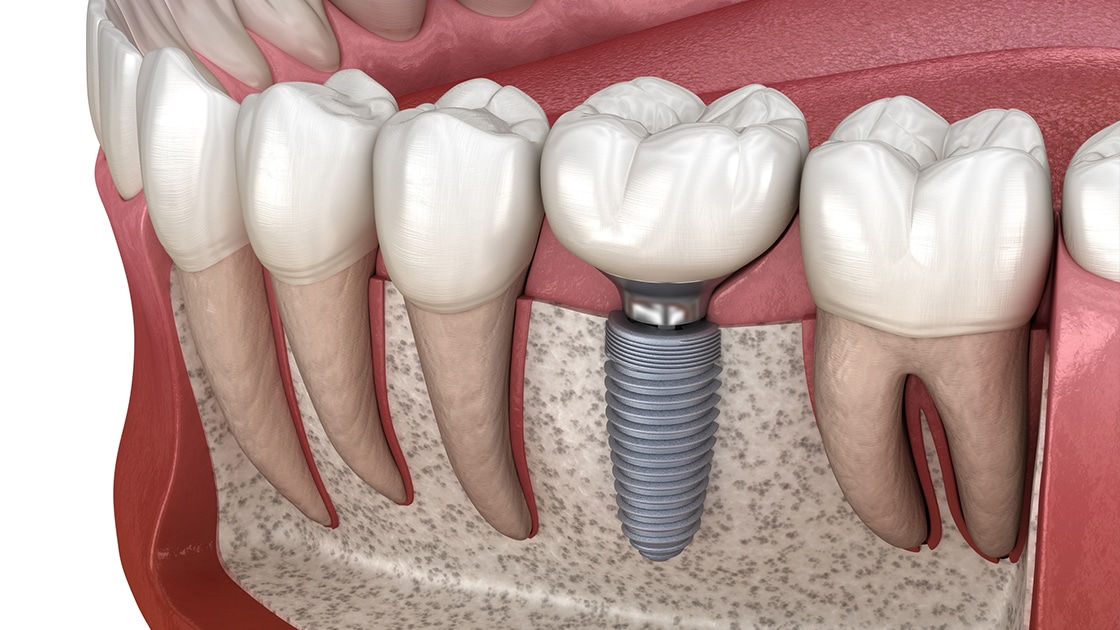The Ultimate Guide To Dental Sense
The Ultimate Guide To Dental Sense
Blog Article
Dental Sense - The Facts
Table of ContentsSome Ideas on Dental Sense You Should KnowExcitement About Dental SenseHow Dental Sense can Save You Time, Stress, and Money.The Definitive Guide to Dental Sense
are medical gadgets surgically implanted into the jaw to restore an individual's capacity to chew or their appearance. They provide assistance for artificial (fake) teeth, such as crowns, bridges, or dentures. When a tooth is lost because of injury or disease, a person can experience problems such as quick bone loss, malfunctioning speech, or modifications to chewing patterns that cause pain.Dental dental implant systems contain a dental implant body and oral implant joint and may also consist of a joint fixation screw. Wisdom tooth cavity. The oral implant body is surgically put in the jawbone in area of the tooth's origin. The oral implant abutment is generally connected to the implant body by the joint addiction screw and extends via gums right into the mouth to sustain the connected man-made teeth
(https://moz.com/community/q/user/dentalsense1)Framework of The Oral Implant System picking oral implants, talk with your oral copyright regarding the prospective benefits and risks, and whether you are a candidate for the procedure. Points to consider: Your total wellness is a vital consider identifying whether you are a good prospect for dental implants, how long it will take to recover, and the length of time the implant may stay in location.
Smoking cigarettes might impact the recovery process and decrease the lasting success of the implant. The recovery procedure for the implant body might take numerous months or longer, throughout which time you usually have a momentary joint in area of the tooth. the dental implant treatment: Meticulously adhere to the dental hygiene guidelines offered to you by your dental service provider.
9 Easy Facts About Dental Sense Described
Implant failure can result in the need for another operation to deal with or change the dental implant system. Restores the ability to chew Recovers aesthetic look Assists maintain the jawbone from reducing as a result of bone loss Protects the wellness of the bordering bone and gums Helps keep surrounding (neighboring) teeth stable Enhances lifestyle Damage to bordering all-natural teeth during dental implant placement Injury to the surrounding tissues throughout surgical treatment, such as sinus perforation Injury during surgery (for instance, crack of surrounding jawbone) Inadequate function, such as really feeling like the teeth do not bite together generally A sensation that the tooth hangs or turning in area resulting from a joint screw loosening Implant body failure (looseness of the dental implant body) due to systemic infection, which might be more probable in people with unrestrained diabetes because of regional infection in bone and periodontals sustaining the implant body as a result of delayed recovery, which may be more probable in patients who smoke Trouble cleaning up the periodontals around the dental implant, resulting in bad dental hygiene Unattended gum condition Post-surgical numbness because of nerve impingement or damage Constantly inform wellness care service providers and imaging specialists that you have oral implants prior to any kind of magnetic vibration imaging (MRI) or x-ray treatments.
FDA is not conscious of any adverse events reported for MRI or x-ray procedures with oral implants. Dental implants systems are generally made from products that comply with international agreement requirements of the International Company for Standardization (ISO) or ASTM International. These standards have details of what makes a safe product.

A dental implant is a framework that replaces a missing tooth. With screw-like tools, the cosmetic surgeon inserts a dental implant into the jawbone, and it acts as an anchor for an artificial tooth, called a crown.
The Facts About Dental Sense Uncovered
Some individuals are not eligible for dental implant surgical procedure. It is for oral surgeons to operate people with: acute illnessuncontrollable metabolic diseasebone or soft cells condition or infectionIf these concerns are resolved, an individual can have the surgical procedure. In, oral doctors avoid running on individuals with: If people with any one of the above go through dental implant surgery, there is a greater danger of the implant stopping working.

Oral implant surgical procedure is a customized procedure. It's not the exact same for everyone. However the following gives a basic review of what you can anticipate your dental expert, dental surgeon, periodontist or prosthodontist to do: Place the dental implant operatively. Provide you time to recover. Affix the article and last crown, bridge or denture.
Next, your specialist will carefully place the oral implant right into your jaw. If your implant is near the front of your mouth, your dental professional will make a momentary tooth for you to use until you recover.
Excitement About Dental Sense
During the recovery phase, your jawbone must fuse to the dental implant. This process can take anywhere from 3 to nine months.
When your dental implant heals, your dental expert can connect the joint (small port blog post) and your final remediation (crown, bridge or denture). This typically takes about one hour to complete and might need a 2nd minor surgical procedure. You shouldn't feel any kind of pain throughout your oral implant procedure since your supplier will make use of drug to numb your gums.
Report this page